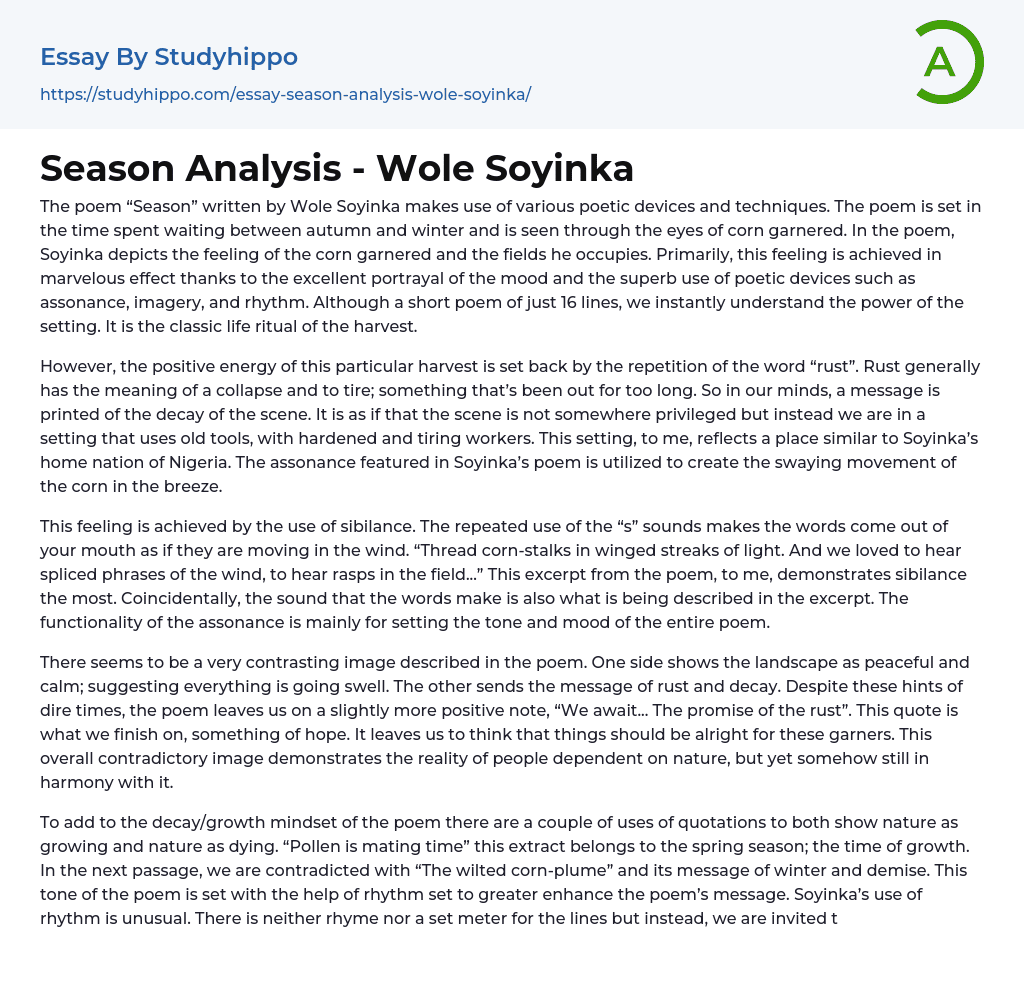However, the positive energy of this particular harvest is set back by the repetition of the word “rust”. Rust generally has the meani
...ng of a collapse and to tire; something that’s been out for too long. So in our minds, a message is printed of the decay of the scene. It is as if that the scene is not somewhere privileged but instead we are in a setting that uses old tools, with hardened and tiring workers. This setting, to me, reflects a place similar to Soyinka’s home nation of Nigeria. The assonance featured in Soyinka’s poem is utilized to create the swaying movement of the corn in the breeze.
This feeling is achieved by the use of sibilance. The repeated use of the “s” sounds makes the words come out of your mouth as if they are moving in the wind. “Thread corn-stalks in winged streaks of light. And we loved to hear spliced phrases of the wind, to hear rasps in the field...” This excerpt from the
poem, to me, demonstrates sibilance the most. Coincidentally, the sound that the words make is also what is being described in the excerpt. The functionality of the assonance is mainly for setting the tone and mood of the entire poem.
There seems to be a very contrasting image described in the poem. One side shows the landscape as peaceful and calm; suggesting everything is going swell. The other sends the message of rust and decay. Despite these hints of dire times, the poem leaves us on a slightly more positive note, “We await... The promise of the rust”. This quote is what we finish on, something of hope. It leaves us to think that things should be alright for these garners. This overall contradictory image demonstrates the reality of people dependent on nature, but yet somehow still in harmony with it.
To add to the decay/growth mindset of the poem there are a couple of uses of quotations to both show nature as growing and nature as dying. “Pollen is mating time” this extract belongs to the spring season; the time of growth. In the next passage, we are contradicted with “The wilted corn-plume” and its message of winter and demise. This tone of the poem is set with the help of rhythm set to greater enhance the poem’s message. Soyinka’s use of rhythm is unusual. There is neither rhyme nor a set meter for the lines but instead, we are invited to listen to the words fall and flow together in a serene and calm manner.
The flow is not hindered by line breaks either, “Thread corn-stalks in winged Streaks of light. ” The asterisk is where
the line break is set in the poem but does nothing to stop the flow of the words. Not only does this effect let it flow, but it also adds to the whole worry-free feeling of the poem at that set time. In conclusion, the poem Season uses various poetic devices to further enhance the overall mood of the poem. The poem and its feel of the rustling cornfields are best described through the use of assonance and imagery. Wole Soyinka’s use of these devices ensures that it is effective in its meaning.
- Boo Radley essays
- Genesis essays
- Richard iii essays
- Alice in Wonderland essays
- On the road essays
- Ozymandias essays
- The Nightingale essays
- Holden Caulfield essays
- Animal Farm essays
- 1984 essays
- A Hanging essays
- Shooting An Elephant essays
- A Tale Of Two Cities essays
- Adventures Of Huckleberry Finn essays
- Arthur Conan Doyle essays
- Brave New World essays
- Characters In Hamlet essays
- Characters In Romeo And Juliet essays
- Desdemona essays
- Diary Of A Wimpy Kid essays
- First-Person Narrative essays
- Frankenstein essays
- Heart Of Darkness essays
- Jane Eyre essays
- Jay Gatsby essays
- King Duncan essays
- Librarian essays
- Little Red Riding Hood essays
- Lord Of The Flies essays
- Silas Marner essays
- The Cask Of Amontillado essays
- The Catcher In The Rye essays
- The Crucible essays
- The Handmaid's Tale essays
- The Reader essays
- Virgil essays
- Wuthering Heights essays
- Candide essays
- Castle essays
- J. D. Salinger essays
- Ulysses essays
- Ethan Frome essays
- In Cold Blood essays
- Outliers essays
- Tuesdays With Morrie essays
- The Art of War essays
- Wife of Bath essays
- Huckleberry Finn essays
- The Lady With The Dog essays
- Great Expectations essays




